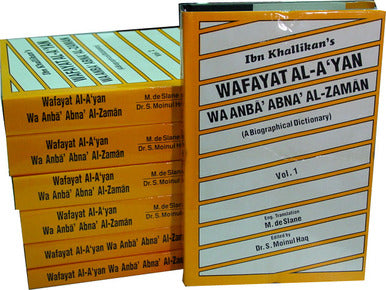
Ibn Khalikan's Wafayat Al-A'yan wa Anba
by Kitab Bhavan
Original price
$165.00
-
Original price
$165.00
Original price
$165.00
$165.00
-
$165.00
Current price
$165.00
This is a monumental work of Ibn Khallikan, an eminent jurist consult and distinguished historian. The author had gained name and fame through this book because it attracted the attention of Orientalists in early nineteenth century. The translator, a well-known scholar, Mr. M.G. de Slane brought out its first edition in 1838. Then he published its English translation. As he has not properly transliterated the oriental names, necessary correction have been made in their orthography. In footnotes the editor has also added the corresponding Christian dates of events on the basis of Eduard Mahler's calculation; de Slane has given the names of the months only.
Its usefulness is obvious in the statement of an oriental scholar Mr. Brockelmann- "It is one of the most important aids to the study of biographical and literary history." Therefore, it has a great importance of civil and literary history of Muslim people. From its first appearance till the present day its reputation has continued and undiminished. It will provide with valuable materials to the Islamic research students as well as teachers and historians.
Abu-l وAbbas Ahmad ibn Khallikan was born at Arbela, Iraq, in 1211 CE. By his talents and his writings he received the title of the most learned man and the ablest historian of that city. He studied jurisprudence at Mosul and after a brief stay at Damascus, settled in Cairo, where he gained pre-eminence as a jurist, a theologian, and a grammarian. He married in 1252 CE. He left Cairo to become judge (kadi) of Damascus in 1269 CE. When he was removed later, he returned to Cairo to take up a professorship and to act as deputy to the chief judge. He returned to Damascus to a triumphant welcome to become kadi again, a post he relinquished in 1281 CE, one year before his death.
Ibn Khallikanئs most famous work is this, "The Obituaries of Eminent Men", often referred to as The Biographical Dictionary. It has always been considered as a work of highest importance for the civil and literary history of the Muslim people. It is of enormous scopeùthe English translation by Mac Guckin de Slane occupies over 2,700 pagesù and it is not surprising that later Arabic historians filled their pages with extracts from his work, and that Arabic rhetoricians, grammarians, and compilers of anecdotes have taken choice passages from it.
Khallikan restricted his coverage to those persons who held a conspicuous place in the Muslim world. The pages are full of accounts of individuals who have risen to or fallen from power by intrigue or force, of leaders of military campaigns, of learned men, and of poets. Some historians have in fact criticized him for his concision in recounting the lives of men eminent for the learning in religious law compared with the many pages he might devote to a poet or a literary man. It is also noticeable that he prefers to relate anecdotes illustrating the humanistic character of his subjects rather than describing their lives in full. It is these features that make his work of wider interest to the world outside of Islam. The short extracts presented here rely chiefly on Khallikanئs lives of the poets. The very long Arabic names included contain the genealogy of the person named, and are thus important in a biographical work.
Its usefulness is obvious in the statement of an oriental scholar Mr. Brockelmann- "It is one of the most important aids to the study of biographical and literary history." Therefore, it has a great importance of civil and literary history of Muslim people. From its first appearance till the present day its reputation has continued and undiminished. It will provide with valuable materials to the Islamic research students as well as teachers and historians.
Abu-l وAbbas Ahmad ibn Khallikan was born at Arbela, Iraq, in 1211 CE. By his talents and his writings he received the title of the most learned man and the ablest historian of that city. He studied jurisprudence at Mosul and after a brief stay at Damascus, settled in Cairo, where he gained pre-eminence as a jurist, a theologian, and a grammarian. He married in 1252 CE. He left Cairo to become judge (kadi) of Damascus in 1269 CE. When he was removed later, he returned to Cairo to take up a professorship and to act as deputy to the chief judge. He returned to Damascus to a triumphant welcome to become kadi again, a post he relinquished in 1281 CE, one year before his death.
Ibn Khallikanئs most famous work is this, "The Obituaries of Eminent Men", often referred to as The Biographical Dictionary. It has always been considered as a work of highest importance for the civil and literary history of the Muslim people. It is of enormous scopeùthe English translation by Mac Guckin de Slane occupies over 2,700 pagesù and it is not surprising that later Arabic historians filled their pages with extracts from his work, and that Arabic rhetoricians, grammarians, and compilers of anecdotes have taken choice passages from it.
Khallikan restricted his coverage to those persons who held a conspicuous place in the Muslim world. The pages are full of accounts of individuals who have risen to or fallen from power by intrigue or force, of leaders of military campaigns, of learned men, and of poets. Some historians have in fact criticized him for his concision in recounting the lives of men eminent for the learning in religious law compared with the many pages he might devote to a poet or a literary man. It is also noticeable that he prefers to relate anecdotes illustrating the humanistic character of his subjects rather than describing their lives in full. It is these features that make his work of wider interest to the world outside of Islam. The short extracts presented here rely chiefly on Khallikanئs lives of the poets. The very long Arabic names included contain the genealogy of the person named, and are thus important in a biographical work.

